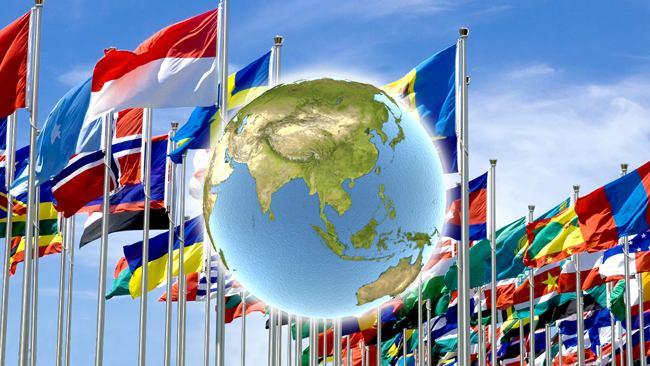Praising imperialism is blasphemy among true progressives, and rightly so. An imperial power controlling and exploiting other nations is morally wrong. After all, the United States of America was founded by rebelling against the British Empire. So, shouldn’t the world be free of imperialism and domination? Wouldn’t a multipolar and democratic world unleash peace and prosperity? Unfortunately, geopolitics is complex and even ugly. The world needs a hierarchical system – an international, rules-based order – that is maintained by a superpower like America or a multilateral global sheriff. The alternative is terrifying anarchy.
Imagine for a moment that the U.S. suddenly shuts down all of its 800 military bases in 140 countries and stops using economic sanctions against rogue nations. Here is what would happen next:
Explosion of Regional Wars
Nature abhors vacuum and so does geopolitics. Without a superpower to constrain them, countries around the world will start maximizing their spheres of influence. In the Middle East, for example, Iran will add Iraq, Syria and Lebanon to its “Shiite Crescent,” which will ignite wars with Saudi Arabia and Israel. And Erdogan will start dreaming of Ottoman Empire 2.0.
Putin will run over Ukraine and Georgia in a couple of days to secure Russia’s strategic interests in Black Sea. He may even try to recreate the Soviet Union, starting with Central Asia. Xi Jinping will invade Taiwan and immediately assert dominion over the so-called nine-dash line, which extends 1000 miles from China’s borders. Weaker countries like Vietnam, Philippines, and Malaysia will either submit to China or there will be disastrous wars, which will invariably pull in Japan.
Civil wars and tribal conflicts will erupt in numerous regions. Afghanistan, which is already collapsing, will devolve into a war-torn nation teeming with terrorist groups like Al Qaeda and Islamic State. Many places in Africa – like Ethiopia, Sudan and Nigeria – will witness civil wars and attract outsiders with malign agendas. Totalitarian regimes and non-state actors will also acquire powerful missiles and weapons of mass destruction.
Disruption of Global Trade
Wars also disrupt sea lanes, land routes, and supply chains. We live in a highly interdependent world where even minor interruptions to supply chains can cripple the global economy. Lack of just one key component can halt the production of everything from pharmaceuticals to computers.
Wars in the Middle East or Asia can shut off Suez Canal or Malacca Strait respectively, paralyzing global trade. Opportunists everywhere will attempt to seize strategic natural resources – oil, coal, iron ore, lithium, cobalt etc. Imagine the leverage China will have after conquering Taiwan, which manufactures 92% of the most advanced semiconductor chips in the world.
Either the rest of the world will comply with such new blackmails or powerful states will be forced to send in fighter jets, aircraft carriers, and soldiers to restore order.
Ergo, we will be back to square one.
Human Rights Abuses
There are vulnerable ethnic and religious minority groups everywhere – Shiites in Sunni countries, Hindus and Christians in Muslim countries, Muslims in communist countries, and the list goes on. Women, gays, refugees, and the disabled are also particularly susceptible to human rights abuses. Without overarching global norms and supervision, horrific crimes against humanity will be perpetrated all over the world.
Conclusion
We take the current international order for granted since the world has been relatively peaceful since WW2. However, one just has to look at the perpetual wars during the previous 5000 years to realize how human beings are innately warmongering. For example, Britain and France used to wage endless wars against each other for centuries. They now enjoy peaceful coexistence not because their human nature has changed fundamentally, but because of the international system that binds them.
While the U.S. has abused its hegemonic powers, it has also been possibly the most benevolent empire in history. America not only made transformational contributions to science, technology, economics, and political governance over the last century but also shared them with the rest of the world. Imagine where China would be now without internet, smartphones, and capitalism. Developing nations have benefited enormously from U.S.-led organizations such as the U.N. and the WTO, U.S.-designed financial frameworks, and the American military that protects global trade routes and supply chains. However, moving forward, the United States has to reduce its military footprint in the world and architect a stable alternative. As I describe in my book China, China, Chyyna – Greatest Disruption to American Century, a multipolar world is inevitable as well as fragile. The three great centers of geopolitical influence – U.S.A., E.U. and China – need to work with the United Nations and forge a great compromise that will reimagine the world order and secure global peace and prosperity for the 21st century.
Related posts:
Views: 0
 RSS Feed
RSS Feed

















 July 10th, 2021
July 10th, 2021  Awake Goy
Awake Goy 

 Posted in
Posted in  Tags:
Tags: 
















